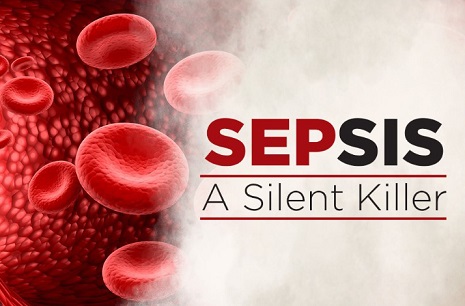Nikhil Prasad Fact checked by:Thailand Medical News Team Jun 23, 2024 10 months, 1 day, 17 hours, 15 minutes ago
Sepsis: Macrophage Activation Syndrome (MAS) is a severe, life-threatening condition characterized by excessive immune activation and systemic inflammation. This hyperinflammatory state can be triggered by various factors, including viral infections, autoimmune disorders, and cancers. MAS is notably associated with viral sepsis, where the body's response to a viral infection leads to widespread organ dysfunction. This
Sepsis News report covers a study review by researchers from the University of Patras, Rio-Greece and the Metropolitan General Hospital, Athens-Greece showing the link involving Macrophage Activation Syndrome (MAS) in viral sepsis and is valid/relevant in the SARS-CoV-2 context as well.
 Viral Sepsis And Macrophage Activation Syndrome
The Role of Cytokines in MAS
Viral Sepsis And Macrophage Activation Syndrome
The Role of Cytokines in MAS
At the heart of MAS is the uncontrolled activation of immune cells, particularly T cells and macrophages. These cells release large quantities of proinflammatory molecules known as cytokines, leading to a "cytokine storm." This storm results in widespread inflammation and can cause significant damage to various organs and tissues, potentially leading to organ failure and death.
MAS and COVID-19: A Closer Look
The COVID-19 pandemic brought significant attention to MAS, as many patients with severe COVID-19 exhibited symptoms similar to this syndrome. In severe cases of COVID-19, patients experienced a pronounced immune response characterized by a cytokine storm. This immune overreaction primarily affected the lungs but also had systemic implications. Researchers observed that the cytokine profiles in severe COVID-19 cases overlapped with those seen in MAS, leading to severe inflammation and poor clinical outcomes.
Diagnosing MAS: A Complex Challenge
Diagnosing MAS is challenging due to its complex nature and the lack of specific diagnostic guidelines, particularly for adults. Physicians often rely on a set of clinical and laboratory criteria to identify MAS. These criteria include persistent high fever, enlargement of the liver and spleen, low blood cell counts, high levels of ferritin (a protein that stores iron), and markers of immune system activation. Fulfillment of at least five out of eight criteria from the HLH-2004 protocol is commonly used for diagnosis, although this protocol was initially designed for primary hemophagocytic lymphohistiocytosis (HLH) in children.
Common Viral Triggers of MAS in Sepsis
-Epstein-Barr Virus (EBV)
EBV is a well-recognized trigger of MAS, particularly in individuals with genetic predispositions. EBV-associated MAS is prevalent in East Asia but occurs globally. The virus activates cytotoxic T cells and macrophages, leading to uncontrolled immune activation and high levels of cytokines. Patients with EBV-MAS often present with severe symptoms, including high fever, enlarged spleen, low blood cell counts, and elevated liver enzymes.
-Cytomegalovirus (CMV)
CMV, anoth
er member of the herpes virus family, can also trigger MAS. This is particularly common in individuals with weakened immune systems. CMV-MAS often follows severe infections, such as CMV pneumonia. Even immunocompetent individuals can develop MAS following CMV infection. Symptoms include fever, enlarged liver and spleen, and elevated inflammatory markers.
-Influenza
Severe influenza infections, particularly those caused by the H1N1 strain, can lead to MAS. The immune response in severe influenza cases shares significant similarities with MAS, including high ferritin levels and decreased natural killer (NK) cell activity. Patients with influenza-associated MAS often present with severe inflammation, low albumin levels, and organomegaly.
MAS in Other Viral Infections
-Herpes Simplex Virus (HSV)
While HSV is less commonly associated with MAS, it can trigger the syndrome, particularly in immunocompromised individuals. HSV-MAS cases often involve infants with disseminated HSV infection, though adults can also be affected. Elevated ferritin levels and severe immune activation are common features.
-Human Immunodeficiency Virus (HIV)
HIV-positive individuals can develop MAS as a complication in various clinical scenarios. MAS may occur during acute HIV infection, as a result of opportunistic infections, or due to immune reconstitution inflammatory syndrome (IRIS) following antiretroviral therapy. Diagnosing MAS in HIV-positive patients is challenging due to overlapping symptoms with advanced HIV/AIDS.
Challenges in Treating MAS
Treating MAS is difficult due to the absence of definitive guidelines. Treatment often relies on protocols used for primary HLH, which include corticosteroids, etoposide, and cyclosporine. Recently, cytokine-targeted therapies have shown promise, especially in MAS cases associated with autoimmune diseases. Balancing immunosuppressive treatment with infection control is crucial for managing MAS effectively.
MAS and COVID-19: Diagnostic and Therapeutic Advances
The COVID-19 pandemic provided an opportunity to study MAS extensively, particularly in the context of severe viral infections. Researchers found that the immune response in severe COVID-19 cases exhibited lung-centric inflammation similar to MAS. This has led to the development of new diagnostic criteria and therapeutic approaches. For instance, cytokine-targeted therapies, such as IL-1 blockers (anakinra) and IL-6 blockers (tocilizumab), have been explored for treating COVID-19-associated MAS. Early use of these therapies has shown potential in reducing the severity of cytokine storms and improving patient outcomes.
Conclusion: Moving Forward with MAS Research and Treatment
Macrophage Activation Syndrome is a severe condition that can be triggered by various viral infections, leading to viral sepsis. The COVID-19 pandemic highlighted the importance of understanding MAS, as severe cases of the virus exhibited symptoms similar to this syndrome. Early diagnosis and appropriate treatment are crucial for improving outcomes in patients with MAS. Ongoing research into cytokine-targeted therapies offers hope for better management of this life-threatening condition. As our understanding of MAS grows, so too does our ability to diagnose and treat it effectively, ultimately saving more lives.
The study review was published in the peer reviewed journal: Viruses.
https://www.mdpi.com/1999-4915/16/7/1004
For the latest
Sepsis News, keep on logging to Thailand Medical News.
Read Also:
https://www.thailandmedical.news/news/the-hidden-threat-lurking-in-the-wake-of-covid-19-the-urgent-need-for-sepsis-awareness
https://www.thailandmedical.news/news/covid-19-news-harvard-study-discovers-that-sars-cov-2-induced-sepsis-is-more-prevalent-and-lethal-contrary-to-initial-assumptions
https://www.thailandmedical.news/news/researchers-stop-cell-suicide-that-worsens-sepsis-arthritis
